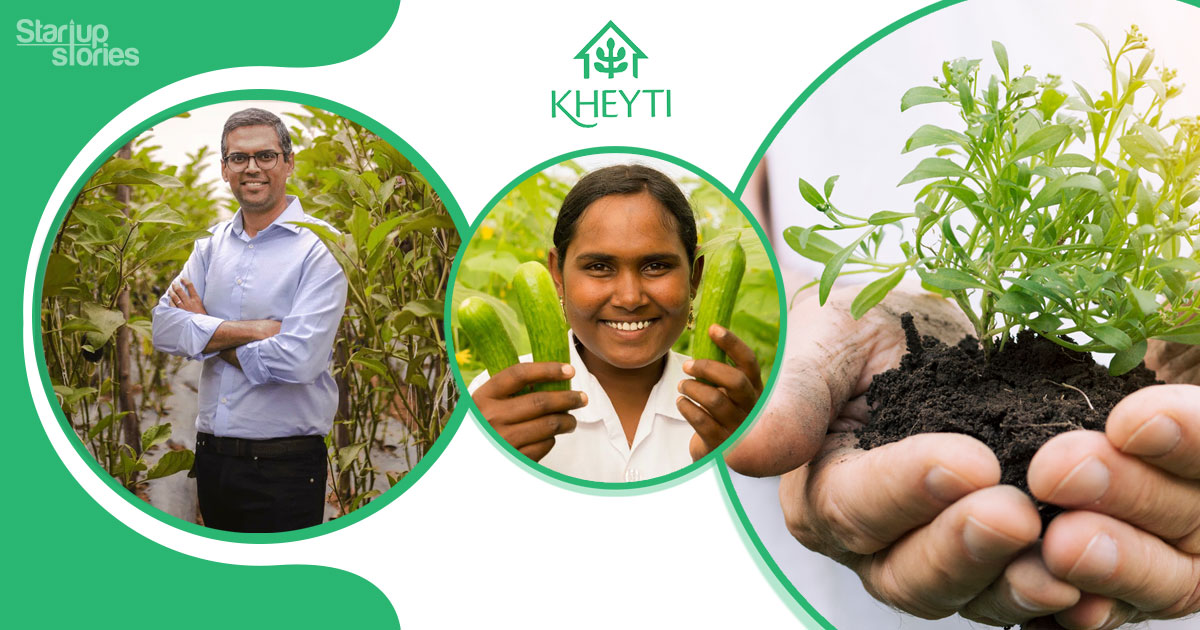Emerging Startup Stories
TruCup: This Startup Is Fighting The Taboo Of Menstruation With Sustainable Sanitary Products

A country like India which is influenced by diverse cultures and religions over the ages, there are multiple belief systems which also come with their own share of taboos and stigmas. Most of these taboos are based in deep rooted ignorance and also the lack of proper educational awareness among the Indian population. One such taboo, is the stigma surrounding menstruation, because it is treated like a societal evil. The problem is due to the old school thinking which associates menstruation with impurity. While the stigma is one problem, another problem is the lack of means for a large number of women to purchase the necessary sanitary products because of their high price.
This is where a startup named TruCup comes into the picture. TruCup was founded by two women entrepreneurs Shivangi Bagri and Alakshi Tomar. Shivangi Bagri used to have to endure excruciatingly painful periods before purchasing a menstrual cup from Singapore and realised the product made her life better by easing her periods. Being a Yoga teacher and a dive enthusiast, Shivangi’s life changed for the better after using a menstrual cup. It was then she realised how the current market products are misleading women by convincing them to buy products which contain synthetic fabrics, fragrances and chemicals. This motivated Shivangi to come up with the perfect menstrual cup.
Alakshi Tomar on the other hand used to work with schools in the slums of Mumbai and it was there she saw the neglect of menstrual hygiene. The problems she saw while working in the slums coupled with her own sedentary lifestyle during her periods made her switch to a menstrual cup.
The two (Shivangi and Alakshi) became friends in school, and remained so even when they moved to different cities for higher education. A chance WhatsApp conversation between Shivangi and Alakshi led to them realising they are the only two women using cups in a group of 15 friends from school. The two figured there was an urgent need to create the perfect cup for all menstruating women. After months of research and constant design feedback from women who used cups, they came up with a comfortable design.
According to TruCup, one billion pads and tampons are disposed of in India each month. Another 64% of women use cloth for sanitary purposes in India and another 95% of women do not use menstrual products due to taboo/myths surrounding insertion, virginity and hygiene.
ALSO READ: How One Indian Startup Is Tackling The Problem Of Floral Waste
Shivangi and Alakshi set out to create demand in a market dominated by sanitary napkins and were able to expand organically to 56 cities through online and offline sales. Women who used their products are their best promoters as they are vocal about the quality of their products and recommend it to other women. TruCup trained more than 1600 women on menstrual hygiene, established partnerships through governmental and non governmental agencies and impacted more than 60,000 women through different projects. Shivangi and Alakshi however have a long term goal to destigmatize the taboo surrounding menstruation and to make the public have conversations on menstrual health and hygiene. TruCup plans to train people of gender roles and how gender roles shape the way people think, organise and know the world. TruCup also provides training on sexual and reproductive health as well as menstruation. Furthermore, TruCup also aims to create awareness about the environmental impacts due to unsafe disposal practices of sanitary napkins and the importance of sustainable menstrual products.
TruCup is bringing a revolution to women’s health with their community awareness programs and their top quality TruCup!
Emerging Startup Stories
WhatsApp’s Bharat Yatra: Empowering Small Businesses Across India!

WhatsApp has embarked on a nationwide initiative called Bharat Yatra to empower small and medium businesses (SMBs) across India. This innovative mobile bus tour aims to provide hands-on training and support to help businesses leverage the power of digital technology, particularly through the WhatsApp Business app.
Key Focus Areas
- Digital Skill Enhancement: The Bharat Yatra program is designed to equip SMBs with essential digital skills necessary to thrive in the digital age. This includes training on how to effectively navigate the digital landscape and utilize online tools for business growth.
- WhatsApp Business App Training: Participants will learn how to use the WhatsApp Business app to connect with customers, share product catalogs, and manage inquiries efficiently. This training is crucial for businesses looking to enhance customer engagement and streamline communication.
- Latest Features and Updates: The tour will highlight the latest features of WhatsApp Business, including Meta Verified, which enhances business credibility, and custom messaging options that allow for personalized communication with customers.
- AI Integration: Businesses will also be introduced to the potential of Meta AI integration, which can streamline customer engagement processes and boost overall productivity. This aspect of the training aims to familiarize SMBs with advanced tools that can enhance their operational efficiency.
Tour Details
The Bharat Yatra will kick off its journey in Delhi-NCR, visiting bustling markets such as Laxmi Nagar, Rajouri Garden, and Nehru Place. Over the coming months, the bus will cover key business hubs in cities like Gurugram, Noida, Agra, Lucknow, Indore, Ahmedabad, and others. Each stop will feature interactive demos, expert guidance, and personalized support tailored to the unique needs of local businesses.
Impact on the Indian Economy
By engaging directly with businesses across major cities, WhatsApp aims to create a tangible impact on the Indian economy. The initiative aligns with WhatsApp’s broader goal of supporting small businesses and fostering digital growth in India. According to Ravi Garg, Director of Business Messaging at Meta India, “Small businesses are the backbone of India’s economy, and with the right digital tools, they have the power to supercharge the country’s digital transformation.”
Conclusion
As the Bharat Yatra continues its journey across India, it is expected to empower thousands of SMBs, contributing significantly to India’s economic development and digital transformation. By providing essential training and resources, WhatsApp is not only enhancing business capabilities but also reinforcing its commitment to fostering a robust small business ecosystem in India. This initiative builds on previous efforts such as WhatsApp Se Vyapaar, which aimed to upskill millions of traders, further demonstrating WhatsApp’s dedication to supporting India’s entrepreneurial landscape.
Emerging Startup Stories
Discover Kheyti, The Startup Changing The Lives of Farmers In India

Farming has been an integral part of India’s history and culture for ages. It’s been the foundation of the Indian economy, supporting millions of people with food and jobs. Crops and agriculture hold immense importance in Indian society, not just in terms of money, but also in terms of culture, community, and spirituality.
Farming is a way of life for many people in India, but it can be a difficult and unpredictable business and farmers face a number of challenges, from erratic weather patterns to low market prices for their crops. Kheyti is a social enterprise founded in 2015 by Saumya, Kaushik Kappagantula, and Sathya Raghu. The organisation provides sustainable solutions to small farmers in India, helping them overcome challenges and improve their lives.
Kheyti’s flagship product is the “Greenhouse-in-a-Box,” a low-cost modular greenhouse that allows farmers to grow high-value crops year-round, even in unfavourable weather conditions. operates on a subscription-based model, where farmers can purchase a “Greenhouse-in-a-Box” kit or sign up for crop advisory services on a monthly or annual basis. Kheyti.com also earns revenue by connecting farmers with markets and buyers, taking a small commission on sales. They work to keep the costs low by partnering with local manufacturers to produce their products and leveraging tech to provide personalised crop advisory services at scale.
They also provide crop advisory services to farmers, offering personalised advice on crop selection, planting, and management. In total, The company has helped over 6,000 small farmers increase their incomes by an average of 300%. You call them small farmers, Kheyti calls them Smart farmers!
While there are other companies in India that offer similar solutions to small farmers, Kheyti stands out for its focus on sustainability, innovation, and community involvement. It works closely with farmers to develop tailored solutions that meet their needs while focusing on sustainable farming practices. Through its efforts, Kheyti has improved soil health, reduced water usage, and increased yields of various crops.
Looking ahead, Kheyti plans to expand its reach to more farmers in India and beyond and aims to continue developing new products and services that can help small farmers overcome the challenges they face. With its commitment to sustainability and innovation, The visionaries at Kheyti claim it has the potential to transform the agricultural sector and contribute to a more equitable future for all.
Imagine the joy and hope Kheyti brings to struggling farmers in India. With Kheyti’s help, over 6,000 small farmers have transformed their lives, becoming Smart farmers who handle challenges and succeed. With sustainable solutions, Kheyti is not only revolutionising agriculture but also spreading hope for a brighter future.
Emerging Startup Stories
Suki: This Startup Wants To Transform Healthcare With Its Artificial Intelligence Tool

We live in a rapidly transforming era where humanity is making exponential leaps in technology. Thirty years ago, no one would have believed you could talk to an online voice assistant to create tasks and get things done. Ten years ago, no one would have believed humanity would land robots on Mars. Technology truly has improved the quality of living of every human who owns a smartphone and has access to an internet connection. Voice assistants are slowly replacing manual tasks and making lives easier and efficient. Siri, Alexa, Google Voice Assistant are just some of the widely used artificial intelligence based tools which are employed on a daily basis. Artificial intelligence, which is hailed as the technology of the future is now slowly making its way into much more complex domains like self driving vehicles, quantum computing and also health care.
Suki, a United States of America based startup founded by Punit Soni, developed their own voice assistant which runs on artificial intelligence to simplify healthcare for doctors and other healthcare professionals. In simple terms, Suki is akin to Siri for doctors. While you could order a pizza or schedule an appointment on Siri, doctors could modify, edit and add health records of their patients. Suki is a powerful tool to help doctors with documentation of health records which often take hours of their (doctors) time.
Suki currently focuses on documentation but has the potential to expand its usage to data queries, ordering, prescribing and billing. According to a white paper published by Suki, using its technology increases the time a doctor spends with a patient by 12% by cutting note taking time by 76%. The time which is saved also brings in a financial benefit of $30,000 more in revenue a year on average for doctors.
Suki raised a $ 20 million Series B round from Flare Capital Partners, First Round Capital, and Venrock, doubling its total funding to $ 40 million since its 2017 launch. Suki is also looking to expand its reach in India and has decided to establish Bangalore as their base of operations. India holds a lot of potential for Suki considering the amount of manual work which goes into almost any sector.
It would be interesting to watch how Suki and other similar AI based startups would transform healthcare across the world.













Binance referal code
May 19, 2025 at 7:41 pm
Your article helped me a lot, is there any more related content? Thanks! https://accounts.binance.info/register?ref=P9L9FQKY
Qgubpxbr
May 25, 2025 at 7:35 am
Explore the ranked best online casinos of 2025. Compare bonuses, game selections, and trustworthiness of top platforms for secure and rewarding gameplaycasino.
zxlud
June 4, 2025 at 7:44 pm
clomiphene tablets price in pakistan where can i buy cheap clomiphene no prescription cost generic clomid for sale where to buy cheap clomiphene no prescription says: how can i get generic clomid where to get generic clomiphene tablets clomid challenge test protocol
Skapa personligt konto
September 17, 2025 at 8:54 pm
Your point of view caught my eye and was very interesting. Thanks. I have a question for you.
J88
November 5, 2025 at 8:45 pm
Đến với J88, bạn sẽ được trải nghiệm dịch vụ cá cược chuyên nghiệp cùng hàng ngàn sự kiện khuyến mãi độc quyền.
站群程序
November 7, 2025 at 1:38 am
采用高效谷歌站群策略,快速提升网站在搜索引擎中的可见性与权重。谷歌站群
Kuwin
November 9, 2025 at 10:51 am
kuwin sở hữu kho game đa dạng từ slot đến trò chơi bài đổi thưởng, mang đến cho bạn những giây phút giải trí tuyệt vời.
谷歌蜘蛛池
November 11, 2025 at 5:34 pm
利用强大的谷歌蜘蛛池技术,大幅提升网站收录效率与页面抓取频率。谷歌蜘蛛池
MM88
November 15, 2025 at 10:45 am
Với giao diện mượt mà và ưu đãi hấp dẫn, MM88 là lựa chọn lý tưởng cho các tín đồ giải trí trực tuyến.
GO88
November 16, 2025 at 11:41 pm
Tham gia cộng đồng game thủ tại Go88 để trải nghiệm các trò chơi bài, poker phổ biến nhất hiện nay.
iwin
November 22, 2025 at 2:43 am
iwin – nền tảng game bài đổi thưởng uy tín, nơi bạn có thể thử vận may và tận hưởng nhiều tựa game hấp
MM88
November 30, 2025 at 2:56 am
Khám phá thế giới giải trí trực tuyến đỉnh cao tại MM88, nơi mang đến những trải nghiệm cá cược thể thao và casino sống động.
AtomCasino
December 13, 2025 at 6:33 pm
https://t.me/s/atom_official_casino
kazino_s_minimalnym_depozitom
December 19, 2025 at 12:35 am
https://t.me/s/kazino_s_minimalnym_depozitom/4
starz
December 25, 2025 at 5:23 am
https://t.me/s/Officials_888STARZ
最佳Binance推荐代码
January 3, 2026 at 6:06 pm
Thank you for your sharing. I am worried that I lack creative ideas. It is your article that makes me full of hope. Thank you. But, I have a question, can you help me?
EnriqueKix
February 4, 2026 at 11:47 pm
sep ira accounts [url=https://otvetnow.ru]https://otvetnow.ru[/url] degree ideas
arrbzjob
February 5, 2026 at 8:18 am
https://asklong.ru
EnriqueKix
February 5, 2026 at 5:23 pm
logic online course [url=https://otvetnow.ru]https://otvetnow.ru[/url] best foundation repair method
mdqssize
February 6, 2026 at 3:12 am
https://askoff.ru
EnriqueKix
February 6, 2026 at 5:11 am
top 10 public health schools [url=https://otvetnow.ru]https://otvetnow.ru[/url] dish network tulsa ok
EnriqueKix
February 6, 2026 at 6:02 pm
rob the bank game [url=https://otvetnow.ru]https://otvetnow.ru[/url] toll free numbers com
iqdjkwdz
February 6, 2026 at 11:36 pm
https://askoff.ru
ayjmgbqh
February 8, 2026 at 3:18 am
https://askoff.ru
binance US-registrera
February 9, 2026 at 11:25 am
Thanks for sharing. I read many of your blog posts, cool, your blog is very good.
fdhpzuen
February 12, 2026 at 2:58 am
https://qtjpqhtfcs.wordpress.com
mjlklrty
February 12, 2026 at 3:08 am
https://qtjpqhtfcs.wordpress.com
jajbupda
February 12, 2026 at 4:54 am
https://iagperjusu.wordpress.com
gungjjfu
February 12, 2026 at 4:55 am
https://iagperjusu.wordpress.com
kfmwokmn
February 12, 2026 at 6:15 am
https://dwspqdxcgw.wordpress.com
gbvhwsvm
February 12, 2026 at 7:02 am
https://xrsaugpsya.wordpress.com
twdxvitb
February 12, 2026 at 7:22 am
https://xrsaugpsya.wordpress.com
hhaqmpis
February 12, 2026 at 8:28 am
https://gxvkxeawwa.wordpress.com
nvaagjzm
February 12, 2026 at 8:29 am
https://gxvkxeawwa.wordpress.com
cpnfcndz
February 12, 2026 at 9:43 am
https://azacgxicis.wordpress.com
fslkagqw
February 12, 2026 at 12:17 pm
https://zfcejfyxiv.wordpress.com
mfzxrfkp
February 12, 2026 at 1:37 pm
https://cxadxqpked.wordpress.com
jkjaibad
February 12, 2026 at 2:44 pm
https://cxadxqpked.wordpress.com
iqreuqeu
February 12, 2026 at 2:57 pm
https://akiwdiycje.wordpress.com
lenbkycs
February 12, 2026 at 4:18 pm
https://akiwdiycje.wordpress.com
dmckikkr
February 12, 2026 at 4:47 pm
https://iqakruyprf.wordpress.com
cdiutymx
February 12, 2026 at 4:57 pm
https://iqakruyprf.wordpress.com
tywrvtxv
February 12, 2026 at 7:04 pm
https://dgaiyziytk.wordpress.com
xgdhjnjq
February 12, 2026 at 7:08 pm
https://dgaiyziytk.wordpress.com
keepidtz
February 12, 2026 at 7:28 pm
https://hrjcdfdcvj.wordpress.com
adizcsav
February 12, 2026 at 7:47 pm
https://hrjcdfdcvj.wordpress.com
xlavdkqi
February 12, 2026 at 11:25 pm
https://wryxvrrhxe.wordpress.com
keuxxilm
February 12, 2026 at 11:28 pm
https://wryxvrrhxe.wordpress.com
xeejdxkk
February 13, 2026 at 12:38 am
https://thfdcufqah.wordpress.com